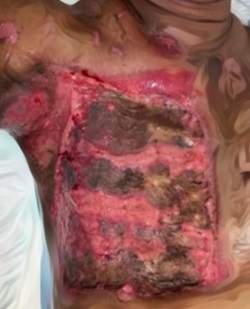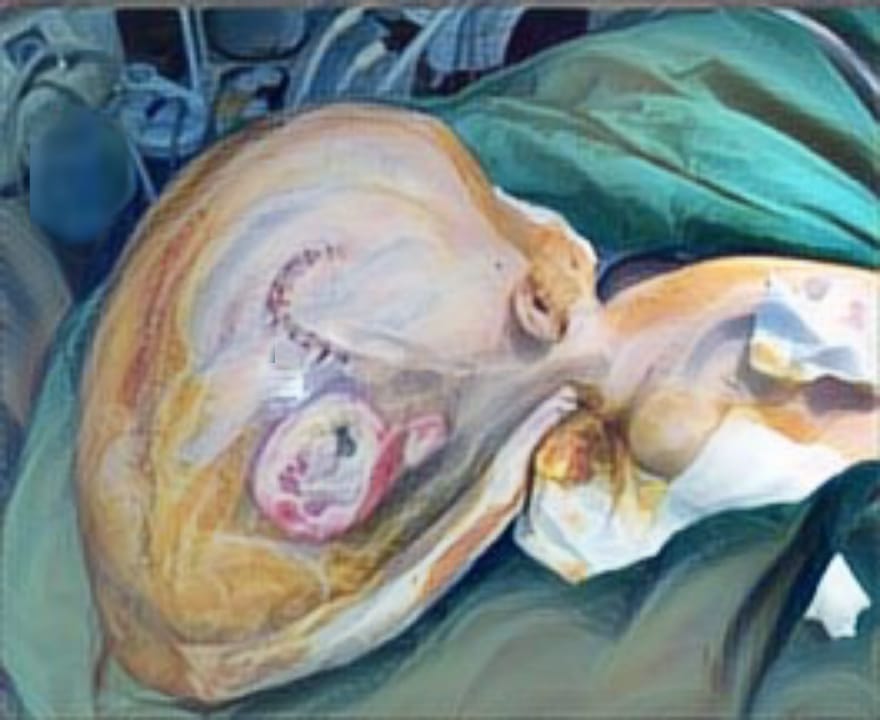CURRENT ROLE OF SOCIAL MEDIA IN AESTHETIC PLASTIC SURGERY: WHY PLASTIC SURGEONS MUST TAKE CONCERN?

Downloads
Highlights:
- This study shows that in the era of society 5.0, digital technology has played a major role in doctor-patient communication in the medical field, especially in plastic aesthetic surgery.
- Only a few plastic surgeons comprehend this digital transformation. It is hoped that this study will help plastic surgeons better understand and adapt to social media.
Abstract:
Introduction: In the medical field, particularly in areas like plastic aesthetic surgery and cosmetology, social media has emerged as a convenient and interactive means of educating and promoting the services of doctors, hospitals, and institutions. However, there remains a pressing need for further research to thoroughly understand the influence of social media on plastic surgery procedures. This study aims to review the literature on the current facets of social media that impact patients' decision-makingin aesthetic plastic surgery.
Methods: Database PubMed was used for the search terms: "plastic surgery," aesthetic, and "social media". Publication time ranges were set from 2019 until 2023. Preferred Reporting Items for Systematic Reviews and Meta-Analysis (PRISMA) were used to help arrange this literature review.
Result: Thirteen records were included in this study. The studies uniformly emphasize the effectiveness of social media as a communication tool between doctors and patients or social media users. Popular platforms like Facebook, Instagram, Snapchat, and Twitter are widely used, varying based on factors like country, age, and gender. These platforms enable the global spread of education and information about plastic aesthetic surgery, effectively reaching a diverse audience.
Conclusion: Social media serves as a platform for disseminating educational content, promoting professional work, engaging with the wider public community, and facilitating patient-doctor interactions in the decision-making process for plastic aesthetic surgery. Additionally, it plays a role in influencing patients' preferences regarding specific aesthetic plastic surgery procedures.
Klietz ML, Kaiser HW, Machens HG, Aitzetmu ller MM. Social Media Marketing: What Do Prospective Patients Want to See? Aesthet Surg J. 2020 Apr 14;40(5):577–83.
Obar JA, Wildman S. Social media definition and the governance challenge: An introduction to the special issue. Telecommun Policy. 2015 Oct 1;39(9):745–50.
Sanati-Mehrizy P, Margulies IG, Sayegh F, Ingargiola MJ, Taub PJ. The "RealSelf Effect": Can Patient Reviews on Social Media Impact Clinic Volume? Ann Plast Surg. 2020 Oct;85(4):352–7.
Shauly O, Marxen T, Goel P, Gould DJ. The New Era of Marketing in Plastic Surgery: A Systematic Review and Algorithm of Social Media and Digital Marketing. Aesthetic Surg J Open Forum. 2023 Feb 28;5:ojad024.
Nischwitz SP, Luze H, Rauch K, Lemelman BT, Heine-Geldern A, Rappl T, et al. Analysis of social media use by European plastic surgery societies: A missing link for #PlasticSurgery. PLoS ONE. 2021 Oct 14;16(10):e0258120.
Janik PE, Charytonowicz M, Szczyt M, Miszczyk J. Internet and Social Media as a Source of Information About Plastic Surgery: Comparison Between Public and Private Sector, A 2-center Study. Plast Reconstr Surg Glob Open. 2019 Mar 25;7(3):e2127.
Alghonaim Y, Arafat A, Aldeghaither S, Alsugheir S, Aldekhayel S, Alghonaim Y, et al. Social Media Impact on Aesthetic Procedures Among Females in Riyadh, Saudi Arabia. Cureus. 2019,11(10). Available from: https://www.cureus.com/articles/24353-social-media-impact-on-aesthetic-procedures-among-females-in-riyadh-saudi-arabia
AlBahlal A, Alosaimi N, Bawadood M, AlHarbi A, AlSubhi F. The Effect and Implication of Social Media Platforms on Plastic Cosmetic Surgery: A Cross-sectional Study in Saudi Arabia From 2021 to 2022. Aesthetic Surg J Open Forum. 2023 Jan 1;5:ojad002.
Mortada H, AlRajhi B, Hashem A, Aljaaly HA, Obeid FM, Gelidan AG, et al. Use and Influence of Social Media on the Private Practice of Plastic Surgeons in Saudi Arabia. Plast Reconstr Surg Glob Open. 2023;11(5):e5012.
Salinas CA, Kuruoglu D, Mayer HF, Huang TC, Sharaf B. Who is talking about #Facelift on Instagram? Eur J Plast Surg. 2022;45(3):415–20.
Panse NS. Advocacy and mass education in plastic surgery: Efforts and outcomes. Indian J Plast Surg Off Publ Assoc Plast Surg India. 2017;50(1):85–90.
Gupta N, Dorfman R, Saadat S, Roostaeian J. An Updated Review of Plastic Surgery-Related Hashtag Utilization on Instagram: Implications for Education and Marketing. Aesthet Surg J Open Forum. 2020;2(2):ojaa011. doi: 10.1093/asjof/ojaa011.
Thakurani S, Gupta S. Evolution of aesthetic surgery in India, current practice scenario, and anticipated post-COVID-19 changes: a survey-based analysis. Eur J Plast Surg. 2021;44(1):129-138. doi:10.1007/s00238-020-01730-z.
Pearlman RL, Wilkerson AH, Cobb EK, Morrissette S, Lawson FG, Mockbee CS, et al. Factors Associated with Likelihood to Undergo Cosmetic Surgical Procedures Among Young Adults in the United States: A Narrative Review. Clin Cosmet Investig Dermatol. 2022;15:859–77.
Al Qurashi AA, Mortada H, Abuthiyab N, Al Zaid N, Aletani T, Arab K. Influential Factors for Selecting a Plastic Surgeon: A National Survey in Saudi Arabia. Plast Reconstr Surg Glob Open. 2022;10(8):e4458.
Rudy HL, Ricci JA. Mining the Twittersphere: Insights about Public Interest in Facial Reanimation Surgery from a Decade of Twitter Data. Indian J Plast Surg Off Publ Assoc Plast Surg India. 2021;55(1):31–5.
Sorice SC, Li AY, Gilstrap J, Canales FL, Furnas HJ. Social Media and the Plastic Surgery Patient. Plast Reconstr Surg. 2017;140(5):1047–56.
Global daily social media usage 2023 [Internet]. Statista. [cited 2023 Sep 18]. Available from:
https://www.statista.com/statistics/433871/daily-social-media-usage-worldwide/
Vardanian AJ, Kusnezov N, Im DD, Lee JC, Jarrahy R. Social Media Use and Impact on Plastic Surgery Practice. Plast Reconstr Surg. 2013 May;131(5):1184.
Donchev D. 40 Mind Blowing YouTube Facts, Figures and Statistics -2023 -FortuneLords [Internet]. 2023 [cited 2023 Sep 18]. Available from: https://fortunelords.com/youtube-statistics/
Economides JM, Fan KL, Pittman TA. An Analysis of Plastic Surgeons' Social Media Use and Perceptions. Aesthet Surg J. 2019;39(7):794–802.
Gould DJ, Leland HA, Ho AL, Patel KM. Emerging trends in social media and plastic surgery. Ann Transl Med. 2016;4(23):455–455.
Arab K, Barasain O, Altaweel A, Alkhayyal J, Alshiha L, Barasain R, et al. Influence of Social Media on the Decision to Undergo a Cosmetic Procedure. Plast Reconstr Surg –Glob Open. 2019;7(8):e2333.
Alghonaim Y, Arafat A, Aldeghaither S, Alsugheir S, Aldekhayel S, Alghonaim Y, et al. Social Media Impact on Aesthetic Procedures Among Females in Riyadh, Saudi Arabia. Cureus [Internet]. 2019;11(10). Available from: https://www.cureus.com/articles/24353-social-media-impact-on-aesthetic-procedures-among-females-in-riyadh-saudi-arabia
Walden JL, Panagopoulous G, Shrader SW. Contemporary decision making and perception in patients undergoing cosmetic breast augmentation. Aesthet Surg J. 2010;30(3):395–403.
Pusic AL, Lemaine V, Klassen AF, Scott AM, Cano SJ. Patient-reported outcome measures in plastic surgery: use and interpretation in evidence-based medicine. Plast Reconstr Surg. 2011;127(3):1361–7.
Gupta N, Dorfman R, Saadat S, Roostaeian J. The Plastic Surgery Social Media Influencer: Ethical Considerations and a Literature Review. Aesthet Surg J. 2020 May 16;40(6):691–9.
Ben Naftali Y, Duek OS, Rafaeli S, Ullmann Y. Plastic Surgery Faces the Web: Analysis of the Popular Social Media for Plastic Surgeons. Plast Reconstr Surg Glob Open. 2018;6(12):e1958.
Fan KL, Economides JM, Song DH. To Bot or Not? Challenging the Top Social Media Influencers in #PlasticSurgery. Plast Reconstr Surg. 2019;143(1):337–43.
Zarringam D, Decates T, Slijper HP, Velthuis P. Increased usage of botulinum toxin and hyaluronic acid fillers in young adults. J Eur Acad Dermatol Venereol JEADV. 2020;34(10):e602–4.
Wheeler CK, Said H, Prucz R, Rodrich RJ, Mathes DW. Social Media in Plastic Surgery Practices: Emerging Trends in North America. Aesthet Surg J. 2011;31(4):435–41.
Braun SE, O'Connor MK, Hornick MM, Cullom ME, Butterworth JA. Global Trends in Plastic Surgery on Social Media: Analysis of 2 Million Posts. Aesthet Surg J. 2021;41(11):1323–32.
Saber DS. The "Instaface Effect": How Social Media Shapes Plastic Surgery Expectations [Internet]. Saber Plastic Surgery. 2022 [cited 2023 Sep 18]. Available from: https://saberplasticsurgery.com/blog/social-media-and-plastic-surgery-expectations/
American Society of Plastic Surgeons. Code of Ethics. https://www.plasticsurgery.org/documents/Governance/asps-code-of-ethics.pdf.
Dyer AR. Ethics, advertising and the definition of a profession. J Med Ethics. 1985;11(2):72-78.
Pablo L. Gutierrez and Debra J. Johnson, MD. Can Plastic Surgeons Maintain Professionalism within Social Media?. AMA J Ethics. 2018;20(4):379-383. doi: 10.1001/journalofethics.2018.20.4.msoc3-1804.
Dorfman RG, Vaca EE, Fine NA, Schierle CF. The ethics of sharing plastic surgery videos on social media: systematic literature review, ethical analysis, and proposed guidelines. Plast Reconstr Surg. 2017;140(4):825-836.
Crane GM, Gardner JM. Pathology image-sharing on social media: recommendations for protecting privacy while motivating education. AMA J Ethics. 2016;18(8):817-825.
Wong WW, Gupta SC. Plastic surgery marketing in a generation of "tweeting” Aesthet Surg J. 2011;31(8):972–6.
Lifchez SD, et al. Guidelines for Ethical and Professional Use of Social Media in a Hand Surgery Practice. Journal of Hand Surgery-American Volume. 2012;37A(12):2636–2641.
Gould DJ, Grant Stevens W, Nazarian S. A Primer on Social Media for Plastic Surgeons: What Do I Need to Know About Social Media and How Can It Help My Practice? Aesthet Surg J. 2017;37(5):614–619.
VRohrich RJ. So, Do You Want to Be Facebook Friends? How Social Media Have Changed Plastic Surgery and Medicine Forever. Plastic and Reconstructive Surgery. 2017;139(4):1021–1026.
McEvenue G, et al. How Social Are We? A Cross-Sectional Study of the Website Presence and Social Media Activity of Canadian Plastic Surgeons. Aesthetic Surgery Journal. 2016;36(9):1079–1084.
Bennett KG, Berlin NL, MacEachern MP, Buchman SR, Preminger BA, Vercler CJ. The Ethical and Professional Use of Social Media in Surgery: A Systematic Review of the Literature. Plast Reconstr Surg. 2018 Sep;142(3):388e-398e. doi: 10.1097/PRS.0000000000004692.
Ki CW' Chloe', Kim YK. The mechanism by which social media influencers persuade consumers: The role of consumers' desire to mimic. Psychol Mark. 2019;36(10):905–22.
Furnham A, Levitas J. Factors that motivate people to undergo cosmetic surgery. Can J Plast Surg J Can Chir Plast. 2012;20(4):e47-50.
Hammadi HA, El-Shereef EA. Study of Knowledge, Attitude and Practices of Plastic Surgery among Females Students at Faculty of Education, Taif University, Saudi Arabia. Am J Public Health Res. 2017;5(3):63–9.
Al-Saiari AA, Bakarman MA. Experiences and attitude among Saudi female University students towards cosmetic surgery. J Taibah Univ Med Sci. 2015;10(4):427–31.
Walker CE, Krumhuber EG, Dayan S, Furnham A. Effects of social media use on desire for cosmetic surgery among young women. Curr Psychol.2021;40(7):3355–64.
Hermans AM, Boerman SC, Veldhuis J. Follow, filter, filler? Social media usage and cosmetic procedure intention, acceptance, and normalization among young adults. Body Image. 2022;43:440–9.
Montemurro P, Cheema M, Tamburino S, Hede n P. Online and Social Media Footprint of All Swedish Aesthetic Plastic Surgeons. Aesthetic Plast Surg. 2019;43(5):1400–5.
Fan KL, Graziano F, Economides JM, Black CK, Song DH. The Public's Preferences on Plastic Surgery Social Media Engagement and Professionalism: Demystifying the Impact of Demographics. Plast Reconstr Surg. 2019 Feb;143(2):619.
Montemurro P, Cheema M, Hede n P. Patients' and Surgeons' Perceptions of Social Media's Role in the Decision Making for Primary Aesthetic Breast Augmentation. Aesthet Surg J. 2018;38(10):1078–84.
Cho MJ, Li AY, Furnas HJ, Rohrich RJ. Current Trends in the Use of Social Media by Plastic Surgeons. Plast Reconstr Surg. 2020;146(1):83e.
Mess SA, Bharti G, Newcott B, Chaffin AE, Van Natta BW, Momeni R, et al. To Post or Not to Post: Plastic Surgery Practice Marketing, Websites, and Social Media? Plast Reconstr Surg –Glob Open. 2019;7(7):e2331.
Aldosari B F, Alkarzae M, Almuhaya R, et al. Effect of Media on Facial Plastic Surgery in Saudi Arabia. Cureus.2019.11(11): e6232. doi:10.7759/cureus.6232
Copyright (c) 2023 Tiara Amanna Amandita, Hastika Saraswati

This work is licensed under a Creative Commons Attribution-ShareAlike 4.0 International License.
JURNAL REKONSTRUKSI DAN ESTETIK by Unair is licensed under a Creative Commons Attribution-ShareAlike 4.0 International License.
- The journal allows the author to hold copyright of the article without restriction
- The journal allows the author(s) to retain publishing rights without restrictions.
- The legal formal aspect of journal publication accessbility refers to Creative Commons Attribution Share-Alike (CC BY-SA)



















